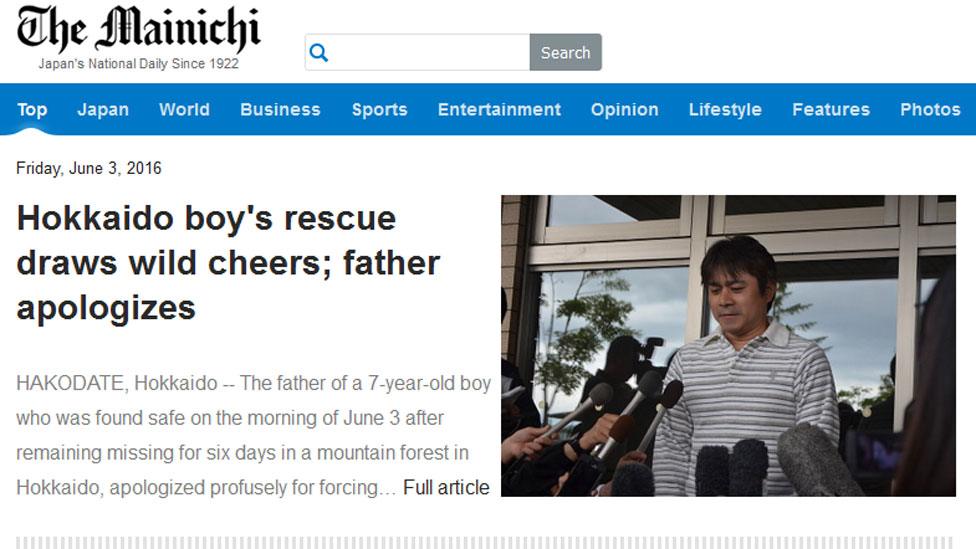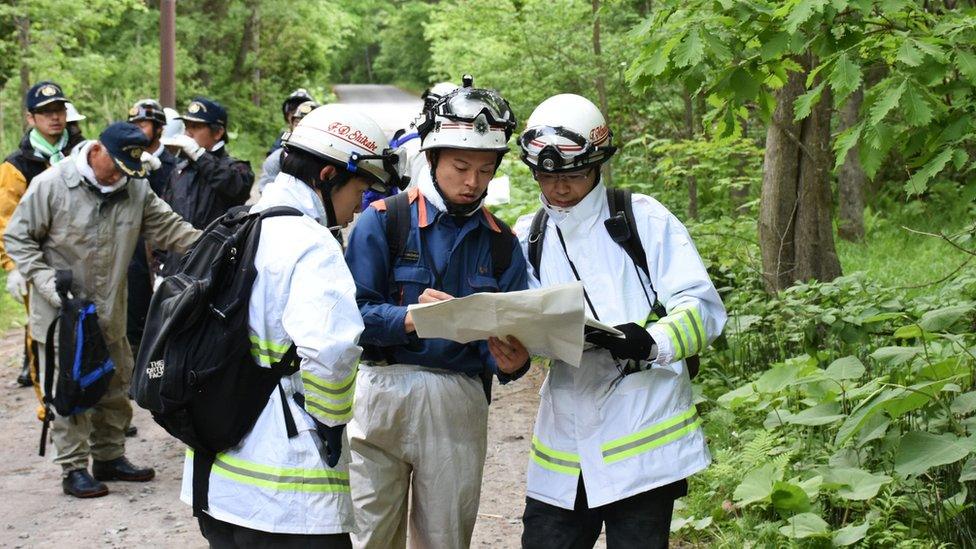World media draw lessons as Japanese boy Yamato Tanooka, 7, found
- Published

The boy was missing for nearly a week
Media in Japan and the rest of the world have expressed relief that Japanese schoolboy Yamato Tanooka was eventually found safe and well after being lost in remote woods for nearly a week.
Some outlets have also reflected on lessons learned about disciplining children, after the boy's parents admitted that they briefly abandoned him as a punishment for throwing stones.

The English-language version of Japan's The Mainichi, external runs the headline: "Hokkaido boy's rescue draws wild cheers; father apologises".
Another Japanese paper, The Asahi Shimbun, external, says "It started with a boy acting up. It ended with a collective sigh of relief across Japan, cheers from a school and an apology from a father who acknowledged that his punishment may have gone too far."
'Fairytale'
Several European papers stress the almost fairytale nature of Yamato's disappearance and eventual rescue, especially given that brown bears are known to frequent the area where he was abandoned.
The German daily Die Zeit, external says that it is "little short of a miracle" that the boy lived to tell the tale of his time in the forest.
And the weekly Der Spiegel , externalhails the fact that Yamato's story has ended happily, noting that Japan has been "holding its breath for almost a week" over his fate.

Several Russian media outlets, including state-controlled Rossiya 24 TV, Zvezda TV and the popular tabloid Komsomolskaya Pravda, external, also celebrate the story's eventual "happy ending".
The French magazine Paris Match, external describes seven-year-old Yamato as "a little Bear Grylls in the making", in a nod to the British wilderness survival expert.
While French news weekly Le Point, external describes his adventures as "a story worthy of Tom Thumb", referring to a fairytale character noted for his impish pranks.
The 'bear child'
More sombre comparisons are drawn elsewhere - for example, Massimo Gramellini, writing in the Italian daily La Stampa, external, refers to the story of Hansel and Gretel - a brother and sister who were abandoned in the woods.
It is difficult, he says, to imagine such an incident occurring in a Mediterranean country, "where a modern parent would have defended their offspring from the victims of his stone-throwing ('such a lot of fuss, he's only a child') and would have explained how to throw stones without getting caught".
And Italian website Viaggi News, external has this advice: "If your children get on your nerves, don't worry, that's normal. What isn't normal is to abandon your child in a forest as a punishment."

The Czech Republic's iDnes celebrates Yamato's rescue
In Russia, a correspondent's report for Rossiya 24 TV points out that although Yamato's parents had intended to discipline him, "who was it that was taught a lesson in the end?"
And the Czech news website iDnes.cz , externalnotes that "The case of young Yamato has sparked a debate in Japan over what is punishment and what is in fact abuse."
As for China, the finding of Yamato has become a major talking point on social media, where he is regularly referred to as "the bear child" - a nickname commonly used to denote a naughty or troublesome child.
Many Chinese social media users have also been quipping about his "tough character" and sense of "adventure".
BBC Monitoring, external reports and analyses news from TV, radio, web and print media around the world. You can follow BBC Monitoring on Twitter , externaland Facebook, external.
- Published3 June 2016

- Published30 May 2016

- Published3 June 2016
